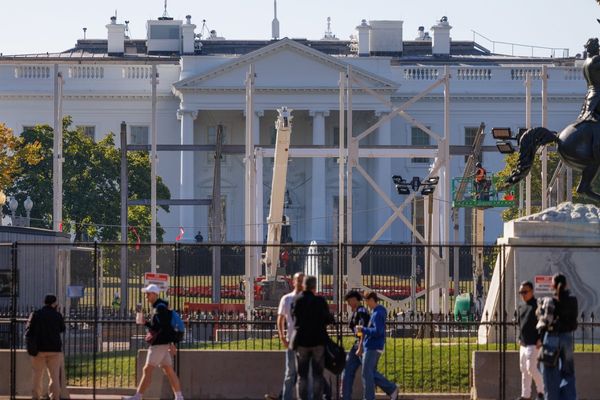WASHINGTON _ With little clout in Sacramento, Republicans are trying to use their power in Washington to reshape California's water policies.
Less than two weeks after state regulators announced sweeping new water allocation limits, the GOP-controlled House is expected this week to pass spending legislation that would block federal funding for that allocation plan. It also includes measures that would bar legal challenges to major water infrastructure projects in the state.
On Friday, Republican Rep. Jeff Denham of California is hosting Interior Secretary Ryan Zinke in his district to "discuss the administration's potential role in improving water infrastructure and protecting Valley water rights."
That's a sign the Trump administration may fight the allocation proposal, which was announced by the California State Water Resources Control Board on July 6.
The legislative proposals have little chance of passing in the Senate, where California's Democratic senators have already pledged to block provisions that pre-empt the state's powers. The legislation would probably need 60 votes to cut off a filibuster, and Republicans control 51 of the chamber's 100 seats.
California Republicans may have more success enlisting their allies in the Trump administration to battle state regulators. President Donald Trump vowed to have the government deliver more water to San Joaquin Valley farmers during the 2016 campaign.
In January, the U.S. Bureau of Reclamation unveiled a proposal to "maximize water deliveries" in the Central Valley, the opposite of what the state water board is now looking to do.
If nothing else, the latest salvos from Washington allow California Republicans to argue they are fighting for agriculture interests and Southern California water consumers _ key political constituencies _ in their long-running battles with conservation groups over stewardship of the state's rivers and reservoirs.
The state's environmentalists were outraged this spring when House Republican budget-writers, led by Rep. Ken Calvert of California, released a 142-page draft spending bill for the Interior Department and related agencies, that included language prohibiting state or federal lawsuits against the multibillion-dollar California Delta tunnels project.
Formally known as California Water Fix, the controversial project would construct two tunnels beneath the Sacramento-San Joaquin River Delta to connect freshwater from the river to aqueducts conveying water south. It's been championed by Democratic Gov. Jerry Brown, who is in his final year in office, but vehemently opposed by many conservation groups and other Democratic politicians.
Republicans were not deterred by the pushback. Instead, at a committee markup in June, they adopted another provision, introduced by Rep. David Valadao of Hanford, to extend the ban on legal challenges to virtually every other major infrastructure project that distributes water across the state_including projects to manage the Sacramento-San Joaquin Delta, as well as the Central Valley Project and State Water Project, two networks of reservoirs, dams and aqueducts.
This week, the House will vote on another amendment, drafted by Denham, targeting the recent proposal by the California Water Board that would restrict the flow of water from the San Joaquin river and its tributaries into Denham's district and other parts of the Central Valley.
The board says the move is necessary to protect a depleted salmon population, but Denham argues that science isn't sound, as salmon populations have fluctuated every year.
The California State Water Resources Control Board is an easy target in California farming communities that don't want to see their water shortages exacerbated.
"This is a water grab that will devastate our community both from a water quality standpoint and starving off some communities from water at all," Denham said. "I feel it's a social justice issue when you're shutting off our water, that can completely devastate our community, over a plan to save the fish that's not based on science at all _ so we are pulling the Interior money back so it can't be used to implement this plan."
The board will vote to finalize its new allocation limits in August. The proposal was widely unpopular in Denham's district, where there is already a water shortage in a farming community that depends on water for its livelihood and has an unemployment rate that is 50 percent higher than the national average.
Denham's effort would strip funding for any attempt to modify the flows of the federally-controlled New Melones Reservoir, effectively killing the California Water Board's decision before it's finalized in parts of the San Joaquin Valley. Zinke is planning to visit that reservoir along with the Don Pedro Dam on Friday.
The House plans to vote on the proposal this week. If approved, it would become part of the House's Interior spending bill. Denham said he is confident, based on conversations with House leadership, that it will pass.
The broader legislation is also expected to sail through the House with Republican support.
"It'll pass out of the House," predicted Democratic Rep. John Garamendi, who represents Davis, Fairfield and other communities to the north and west of Sacramento.
Garamendi and several other California Democrats introduced amendments to remove the language barring legal challenges to state water projects. House Republicans, who have a strong majority in the chamber, refused to allow a vote on their proposals.
Garamendi called the language barring lawsuits "foolish" and "counterproductive."
"It is entirely possible, if that became law, for the tunnels to be built, with no lawsuits, and then no water in the tunnels. And you can't sue!" he told The Bee. "It's a soundbite for Republicans," he added, noting that the Senate will kill those portions of the legislation.
Indeed, California's two senators, Dianne Feinstein and Kamala Harris, both Democrats, have publicly opposed the proposals barring lawsuits against state water projects.
In a May 21 letter to the leaders of Congress' appropriations committees, Feinstein underscored her "strong opposition" to Calvert's proposal blocking lawsuits to the tunnels project. "A project as divisive and complex as the $17 billion Water Fix should only proceed subject to the full scrutiny of our state and federal laws and our established institutions, including review by independent judges," Feinstein wrote.
The senators have not commented on Denham's amendment as it has not passed.
Garamendi acknowledged that even if the Senate strips the California-related measures, Republicans could use the House-passed legislation as leverage to wring other concessions on water policy in future spending negotiations. "Leverage is always part of the process here, you try to gain the upper hand so that you can get your way," he said.
But he said California Republicans' latest gambit was bad policy. "There are other things they can do to get leverage, they've got the votes."







